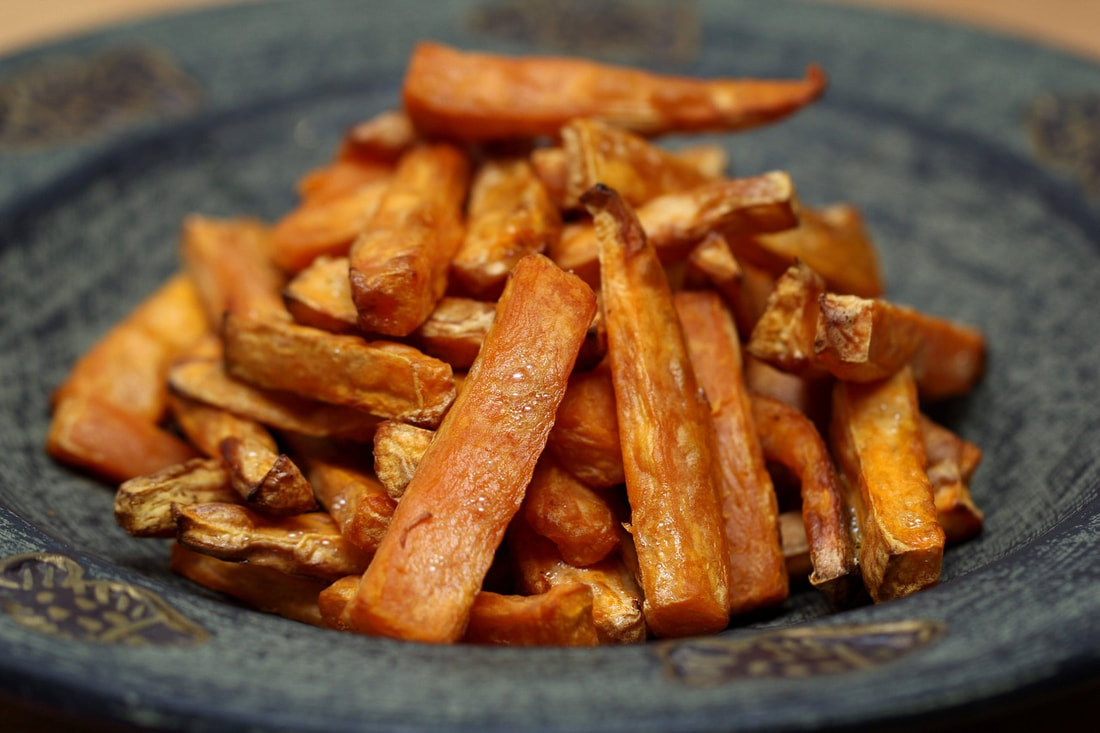|
9/18/2017 Think About It - Sweet Potato FriesSweet potatoes are one of my favourite foods — they're a great addition to almost any meal, and they work as a base for both sweet (dusted with cinnamon) and savoury (dusted with almost anything else) dishes. Luckily the rest of the world is just as keen on these starchy carbs as I am, because sweet potato fries have made their way onto menus in restaurants and fast food joints alike. They're often advertised as a "healthier" alternative to regular french fries — but is this true? Or is this just another marketing scheme? To begin, let's explore the difference between sweet potatoes and regular potatoes. We often associate sweet potatoes with their characteristically orange colour, but there are multiple varieties of them that come in all different shades (my personal favourite is the one that's white on the outside and purple on the inside — it's delicious and looks beautiful when you eat it). They each have slightly different micronutrient contents, so for the purpose of this article we'll use the classic orange version.
You've probably heard the phrase "eat the rainbow" — referring to the idea that colourful foods are often rich in nutrients and key vitamins & minerals. Sweet potatoes are no exception: their rich orange inside results from a high concentration of beta-carotenes (the same compound that makes carrots orange, too). Beta-carotenes are necessary precursors to Vitamin A, and a large sweet potato has 22,000 IU (or 440% of the FDA daily recommended value). Beta-carotene is also converted to retinol in the body, and its consumption is associated with good ocular health as well as reduced symptoms from conditions such as macular degeneration, retinitis pigmentosa, and dry eyes. A deficiency of this critical compound results in the blinding of up to 500,000 children annually in Sub-Saharan Africa and Southeast Asia, despite the fact that a true Vitamin A deficiency is almost impossible to come by in the developed world. If this interests you, check out my article about GMOs and the use of bio-fortified sweet potatoes to help fix this problem. Aside from this though, sweet potatoes and white potatoes are actually pretty similar. Both have between 500-750 milligrams of potassium (about 20% of the FDA daily recommended value), or the equivalent of 1.5 - 2 medium sized bananas! They're also both a great source of Vitamin C, with each harbouring between 17-22 milligrams (about 30-35% of the FDA daily recommended value). With this being said, one of the most nutritionally beneficial aspects of potatoes is their potential source of resistant starch. Resistant starch is often discussed in relation to dietary fibre, and is defined as the "sum of starch and products of starch degradation not absorbed in the small intestine." Cooked and cooled potatoes are a particularly good source of RS3 (retrograded starch), and their consumption has been linked to a reduction in colonic cancer rates, gall stone formation, and fat accumulation. Resistant starch also has the ability to slow digestion — giving it hypocholesterolaemic and hypoglycaemic properties. All of these health benefits can certainly be appreciated, but eating potatoes in the form of french fries has one major caveat --they're fried. One 350g serving (like you'd get in a restaurant) has 32.2 grams of fat (or almost 50% of the FDA daily recommended value). On one hand, the heavy oil content will help with the absorption of all of that Vitamin A, since it's a fat-soluble compound. However, the modern diet has plenty of fat for this purpose, and my article about Nutrition Facts helps explain why most of us probably need less than the FDA recommends. Because of this, sweet potato fries may not be as healthy as they seem — they're a decadent, fatty, treat. Ways to Think About It:
Disclaimer: I am not a licensed nutritionist nor a registered dietician. The opinions expressed in this article are my own, and each individual is ultimately responsible for his/her dietary and nutrition practices. Please consult a physician before starting a new dietary program. Comments are closed.
|
categories: |

